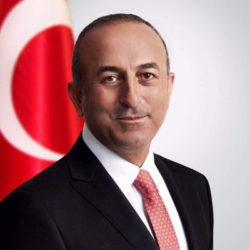HAMBURG, (Reuters) – Turkey’s foreign minister accused Berlin yesterday of exerting systematic pressure on Turkish citizens in Germany and hampering campaigns in support of President Tayyip Erdogan’s bid for new powers in a referendum next month.
Mevlut Cavusoglu was speaking at a rally of Turkish citizens in the residence of the Turkish consulate-general in Hamburg after the building originally scheduled for the meeting was closed by authorities. Turkey accuses Germany of hindering a string of other scheduled meetings by shutting down premises.

“This is systematic obstruction, and Germany is applying systematic pressure on our citizens. This is unacceptable. We always want to see Germany as a friend but Germany’s systematic anti-Turkey approach does not suit our friendship,” Cavusoglu said.
The speech was punctuated by audience chanting of “Recep Tayyip Erdogan, this nation is proud of you”, “Stand straight, don’t bend, this nation is with you” and “Allahu akbar” (God is Greatest).
German Foreign Minister Sigmar Gabriel rejected Cavusoglu’s accusations about systematically blocking Turkish events in a television interview.
“In our legal system, local authorities are generally in charge of security issues,” Gabriel told ZDF broadcaster, adding that authorities in Hamburg decided to close the hall originally scheduled for the speech due to a lack of fire security. Gabriel also criticised Erdogan’s comments comparing German bans on certain political rallies to “fascist actions” reminiscent of Nazi times.
“The comparison is scandalous of course,” he said, adding that such comments further complicated the already difficult relationship between the two NATO allies. Gabriel said he would raise the issue during his meeting with Cavusoglu today in Berlin, adding that it was a good sign that his Turkish counterpart did not repeat the Nazi comments during his speech in Hamburg.
Relations between Germany and Turkey have soured markedly since a failed army bid last July to overthrow Erdogan. Ankara accused Berlin and other European capitals of being tardy and weak in condemning the putschists.
The European Union, including Germany, has since been sharply critical of Turkey’s mass arrests and dismissals of people suspected of links to the coup.
“Germany should not attempt to give us democracy and human rights lessons. We…have never intervened in German politics. Germany shouldn’t intervene in our politics, in our referendum, either,” Cavusoglu said in Hamburg.
Berlin, he said, was hindering supporters of Erdogan in the referendum and favouring those opposed to a new presidential system he says is essential for stability in Turkey, a country with a history of unstable coalition governments.
“They are blocking ‘yes’ voters and supporting ‘no’ voters in our referendum.”
Cavusoglu’s appearance at the mission, cheered by about 150 people, many waving Turkish flags, was intended as an act of defiance towards the German government after local authorities closed down meetings.
The long simmering dispute between NATO partners Germany and Turkey, a key ally in a strategic position bordering Syria, Iraq and Iran, deepened on Sunday when Erdogan accused German officials of acting like Nazis, prompting outrage in Berlin.
German officials deny any political motive for cancelling rallies. Chancellor Angela Merkel has said Berlin will continue to allow Turkish politicians to campaign in Germany for the referendum, provided German law is respected.
Erdogan’s supporters are looking for strong support from an estimated 1.5 million Turkish voters in Germany and from Turks in other European countries to ensure victory at the referendum.
Austria has called for a ban on all Turkish rallies in EU countries, and the Netherlands has also said it does not approve of a meeting planned for Rotterdam.
“Nothing can stop us from convening with our citizens, nothing can cut our ties. We are not afraid of anyone. Our citizens here are our most important and our strongest connection with Germany,” Cavusoglu said.
Erdogan is by far the most popular politician in Turkey, but some voters are wary of his clampdown on the media and dissent, the erosion of the independence of the judiciary, that has grown only more marked since the coup attempt.




